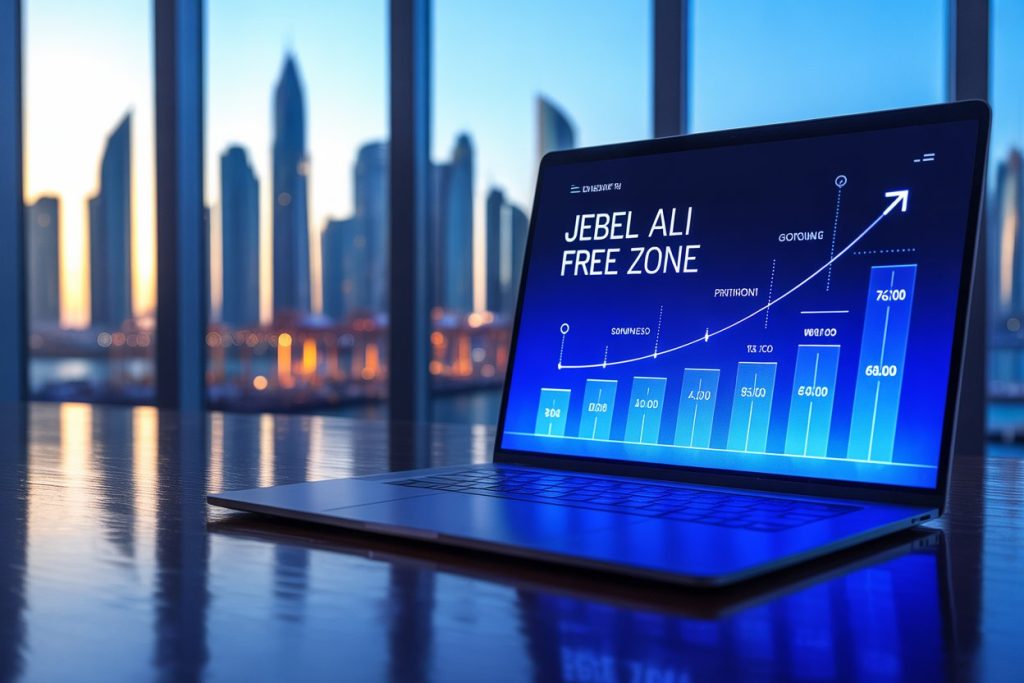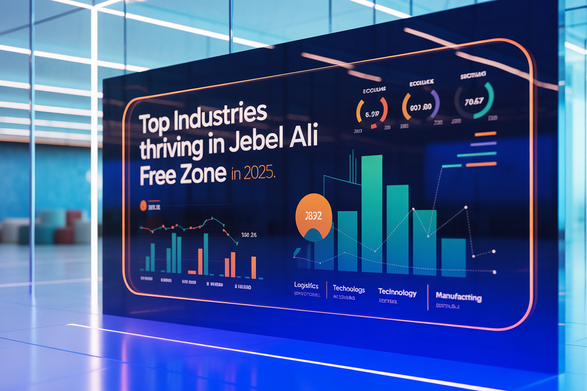The Jebel Ali Freezone (JAFZA) is more than just a business hub, it’s a global ecosystem where trade, logistics, and industries connect. Established in 1985, JAFZA has grown into one of the world’s largest and most successful free zones, hosting thousands of companies from over 140 countries.
While many people know JAFZA for its strategic location next to Jebel Ali Port and Al Maktoum International Airport, fewer realize how diverse the industries here have become. From logistics and e-commerce to food processing and automotive, JAFZA supports a wide variety of sectors.
This blog highlights the top industries thriving in Jebel Ali Free Zone, why they succeed, and what makes JAFZA the right choice for businesses entering these sectors.
Which Industries Flourish in JAFZA and Why?

1. Logistics & Supply Chain
Logistics is the backbone of JAFZA’s growth. With direct access to the largest port in the Middle East and one of the world’s busiest airports, JAFZA companies can move goods quickly across continents.
- Why it works here: World-class customs clearance, bonded warehouses, and multimodal transport options.
- Who benefits: Freight forwarders, distribution companies, and third-party logistics (3PL) providers.
2. Manufacturing & Assembly
Manufacturing companies take advantage of JAFZA’s industrial plots, warehouse facilities, and tax exemptions. Many global brands assemble products in JAFZA before distributing them across the Middle East and Africa.
- Why it works here: Availability of large-scale industrial land, skilled workforce, and duty-free import/export.
- Who benefits: Electronics, construction materials, packaging, and machinery manufacturers.
3. E-Commerce & Fulfillment
With Dubai becoming a regional hub for online shopping, JAFZA has positioned itself as a center for e-commerce companies. Brands set up fulfillment centers here to cut delivery times and costs.
- Why it works here: Seamless connectivity to last-mile delivery partners, tax-free operations, and tech-friendly infrastructure.
- Who benefits: Online retailers, B2B trading platforms, and global marketplaces.
4. Petrochemicals & Heavy Industry
JAFZA is home to a dedicated cluster for petrochemical and energy-related industries. These businesses rely on specialized storage, safety regulations, and large-scale supply chains.
- Why it works here: Proximity to energy suppliers, export-ready port facilities, and industry-specific safety infrastructure.
- Who benefits: Oilfield services, energy traders, and chemical manufacturers.
5. Automotive Trade & Distribution
Cars, trucks, and spare parts flow in and out of JAFZA daily, making it one of the largest automotive trading hubs in the region.
- Why it works here: Easy access to regional markets, specialized storage areas, and favorable trade policies.
- Who benefits: Vehicle exporters, auto-parts distributors, and aftermarket services.
6. Food & FMCG Processing
Food security and fast supply chains have made JAFZA a hot spot for food processing and fast-moving consumer goods (FMCG). Companies use temperature-controlled warehouses and packaging units to serve GCC and African markets.
- Why it works here: Cold storage facilities, halal certification support, and proximity to shipping routes.
- Who benefits: Food processing plants, packaged goods manufacturers, and distributors.
What Makes JAFZA Ideal for These Industries?
JAFZA is not just about location, it’s about the ecosystem.
Quick Answer: JAFZA combines tax benefits, global connectivity, and industry-specific infrastructure, making it ideal for logistics, manufacturing, e-commerce, automotive, petrochemicals, and food sectors.
Key advantages include:
- Zero personal income tax and corporate tax benefits.
- 100% foreign ownership.
- Direct access to Jebel Ali Port and Al Maktoum International Airport.
- No currency restrictions.
- Industry clusters with ready-made facilities.
How to Pick the Best Industry Fit for Your Business in JAFZA
If you’re considering JAFZA, here’s a quick process to identify the right industry:
- Define your business activity – Check if it matches JAFZA’s approved activities list.
- Study your sector’s presence in JAFZA – Look at competitors and supply chains.
- Match infrastructure needs – For example, cold storage vs. large warehouses.
- Evaluate cost vs. benefits – Compare rent, visa quotas, and logistics costs.
- Consult experts – Business setup specialists can guide you through licensing and compliance.
Common Misunderstandings About JAFZA’s Industry Focus
- “JAFZA is only for logistics.”
Not true, while logistics is key, sectors like manufacturing, e-commerce, and automotive are equally strong. - “Only big corporations can afford JAFZA.”
SMEs and startups also thrive here with flexible office and warehouse solutions. - “It’s more expensive than other free zones.”
Costs are balanced by efficiency, global reach, and sector-specific advantages.
FAQs
1. Which sector is growing fastest in JAFZA?
E-commerce and logistics are the fastest-growing industries due to rising online trade.
2. Can small businesses set up in JAFZA?
Yes, JAFZA offers flexible packages for SMEs, not just large corporations.
3. Is JAFZA suitable for food businesses?
Yes, JAFZA has cold storage, halal certification support, and specialized warehouses for food and FMCG.
4. Do all companies in JAFZA get 100% ownership?
Yes, foreign investors enjoy full ownership and profit repatriation.
5. How does JAFZA compare with other free zones?
JAFZA’s strength lies in its connectivity (sea + air) and scale, making it ideal for trade-heavy industries.
Conclusion
The Jebel Ali Freezone is more than a location, it’s a global ecosystem designed for industries that rely on speed, scale, and connectivity. Whether you’re in logistics, manufacturing, e-commerce, or food processing, JAFZA offers unmatched benefits.
Looking to expand in the UAE? Explore how your industry can thrive in JAFZA with expert guidance. Contact Startup Works for tailored advice on setting up your business.


Leave a Reply